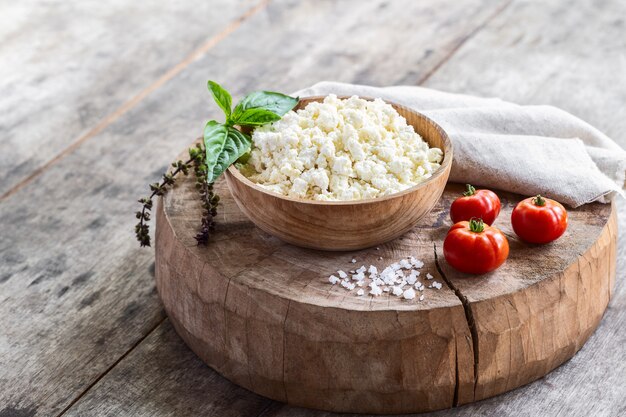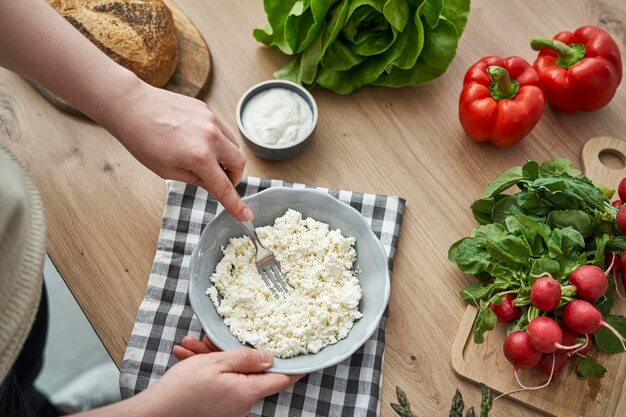Cottage cheese is a popular dairy product in the United States. It has a creamy, lumpy texture and a mild taste, making it a versatile food. Recently, more people are turning to high-protein foods to meet their nutritional goals. This has brought cottage cheese into the spotlight.
Does cottage cheese have protein? The simple answer is yes. Cottage cheese is packed with protein, making it a nutritious choice for people of all ages. This article will explore the protein content in cottage cheese and discuss its health benefits.
What is Cottage Cheese?
Cottage cheese is a fresh, soft cheese made from cow’s milk. Unlike aged cheeses like cheddar, it is not fermented. Its texture is slightly lumpy, and it has a mild, creamy flavor.
How is Cottage Cheese Made?
Cottage cheese is made through a simple process:
- Milk is curdled using an acid or enzyme. This causes the milk solids, or curds, to separate from the liquid whey.
- The curds are then drained and rinsed to remove excess whey, giving cottage cheese its distinct texture.
Types of Cottage Cheese
There are three main types of cottage cheese based on fat content:
- Full-fat cottage cheese – Contains about 4% milk fat.
- Low-fat cottage cheese – Typically has 1-2% milk fat.
- Fat-free cottage cheese – Made using skim milk and has 0% fat.
Each type offers different nutritional profiles while remaining a rich source of protein.
Does Cottage Cheese Have Protein?
Yes, cottage cheese is a protein-rich food. It is an excellent option for people looking to increase their protein intake.
Protein Content
The amount of protein in this cheese can vary based on the type:
- 1 cup (approx. 226 grams) of cottage cheese contains around 25 grams of protein.
- Full-fat cottage cheese provides slightly less protein compared to low-fat and fat-free versions.
| Type | Protein (per 1 cup) | Calories |
| Full-fat | 24 grams | ~220 |
| Low-fat | 25-28 grams | ~190 |
| Fat-free | 28-30 grams | ~160 |
Importance of Casein Protein
Cottage cheese is rich in casein protein, a slow-digesting protein. This makes it a popular choice for:
- Sustained energy release.
- Muscle recovery, especially overnight.
The high casein content ensures you feel full for longer periods, making cottage cheese ideal for weight management and muscle repair.
Nutritional Profile
Cottage cheese is not just about protein. It offers a balanced mix of essential nutrients.
Nutritional Breakdown of Cottage Cheese (1 cup, approx. 226g):
| Nutrient | Full-Fat | Low-Fat | Fat-Free |
| Protein | 24g | 25-28g | 28-30g |
| Calories | ~220 | ~190 | ~160 |
| Fats | 10g | 2-4g | 0g |
| Carbohydrates | 6g | 6g | 6g |
| Saturated Fat | 4g | 1-2g | 0g |
| Calcium | 150mg | 150mg | 150mg |
| Sodium | ~800mg | ~800mg | ~800mg |
Key Nutrients in Cottage Cheese
- Protein: Builds and repairs muscles.
- Calcium: Strengthens bones and teeth.
- Carbs: Provides quick energy.
- Fats: Present in full-fat varieties for energy and flavor.
Low-Fat vs. Full-Fat Cottage Cheese
- Low-fat cottage cheese offers more protein and fewer calories, making it great for weight management.
- Full-fat cottage cheese provides healthy fats and a creamier texture.
Both options are nutritious and depend on individual health goals.
Protein Benefits of Cottage Cheese
The protein in the cheese delivers numerous health benefits. Let’s explore why it’s a great addition to your diet.

1. Supports Muscle Growth and Repair
The casein in cottage cheese promotes muscle growth and recovery. Unlike whey protein, casein digests slowly, providing a steady release of amino acids. This is particularly beneficial for:
- Athletes recovering from workouts.
- People aiming to build muscle mass.
- Those needing protein overnight, such as bodybuilders.
2. Aids in Weight Loss
Cottage cheese is an excellent food for weight loss. Here’s why:
- It is high in protein, which increases feelings of fullness. You are less likely to overeat.
- It is low in calories, especially low-fat and fat-free versions.
- Protein has a higher thermic effect, meaning your body burns more calories digesting it.
By including cottage cheese in meals or snacks, you can control hunger and calorie intake effectively.
3. Provides Sustained Energy
The slow-digesting casein protein provides a steady energy release. Unlike high-sugar foods, cottage cheese prevents sudden energy crashes. It’s an ideal food to eat:
- Before bed for sustained overnight nutrition.
- As a midday snack to curb hunger.
4. Suitable for Athletes and Fitness Enthusiasts
Cottage cheese is popular among fitness enthusiasts for good reason:
- It supports muscle recovery after intense workouts.
- It can be easily paired with other high-protein foods, like eggs or nuts.
- It is versatile—enjoy it as a pre-workout or post-workout snack.
For athletes needing protein-rich meals, cottage cheese is a simple and effective option.
Comparison With Other Protein-Rich Dairy Products
Cottage cheese is not the only dairy product rich in protein. Let’s compare it to other options like Greek yogurt, milk, and cheese.
Cottage Cheese vs. Greek Yogurt
- Protein Content: Both are excellent sources of protein. A 1-cup serving of cottage cheese contains 24-28 grams of protein, while the same serving of Greek yogurt provides about 20 grams. Cottage cheese has a slight edge for higher protein content.
- Calories and Fat: Greek yogurt is typically lower in calories compared to full-fat cottage cheese. Low-fat cottage cheese, however, can match Greek yogurt’s calorie profile.
- Taste and Versatility: Cottage cheese has a mild, creamy flavor and works well in savory dishes or as a standalone snack. Greek yogurt is tangier and is often preferred in smoothies, bowls, and desserts.
| Dairy Product | Protein (per cup) | Calories | Fat |
| Cottage Cheese | 24-28g | 160-220 | 0-10g |
| Greek Yogurt | 20g | 100-150 | 0-5g |
Other Dairy Products
- Milk: A cup of milk contains about 8 grams of protein. While nutritious, it doesn’t match cottage cheese’s protein density.
- Regular Cheese: Cheddar, mozzarella, and other cheeses are high in protein but also rich in calories and fat.
- Yogurt: Regular yogurt contains about 10 grams of protein per cup but is higher in sugars and lower in protein compared to Greek yogurt or cottage cheese.
Cottage cheese stands out for its high protein content, making it one of the best dairy options for a protein boost.
Related to Read: Cottage Cheese Recipe
How Much Protein Do You Need Daily?
The amount of protein you need daily depends on your age, activity level, and overall health. According to the USDA guidelines:
- The average adult should consume 0.8 grams of protein per kilogram of body weight daily.
- For example, a 150-pound adult needs about 55 grams of protein per day.
How Cottage Cheese Helps Meet Protein Needs
Cottage cheese is a protein powerhouse:
- Just 1 cup of low-fat cottage cheese provides 25-28 grams of protein. That’s nearly 50% of the daily requirement for many adults.
- It’s an easy and affordable way to increase your protein intake without adding excessive calories.
For people following a high-protein diet—such as athletes, fitness enthusiasts, or those on a weight-loss plan—cottage cheese is an ideal food. You can incorporate it into meals throughout the day to hit your protein targets effortlessly.
How to Include Cottage Cheese in Your Diet
Cottage cheese is incredibly versatile and can be enjoyed in various ways. Here are some ideas to include it in your daily meals:
Breakfast Ideas
- Add cottage cheese to your morning smoothies for a creamy texture and protein boost.
- Pair it with fresh fruits like berries, bananas, or peaches for a quick, nutritious bowl.
- Spread it on whole-grain toast and top with avocado or a drizzle of honey.
Lunch and Dinner Ideas
- Mix cottage cheese into salads for a creamy texture and added protein. It pairs well with spinach, cherry tomatoes, and cucumbers.
- Use it as a topping for baked potatoes or whole-grain pasta as a protein-rich alternative to sour cream.
- Combine cottage cheese with scrambled eggs for an extra protein punch.
Snack Ideas
- Pair cottage cheese with nuts, seeds, or crackers for a satisfying, protein-rich snack.
- Add a sprinkle of cinnamon and a handful of raisins for a sweet treat.
- Use it as a dip with carrot sticks or cucumber slices.
Quick High-Protein Recipes
- Cottage Cheese Smoothie: Blend 1 cup cottage cheese, 1 banana, a handful of berries, and a splash of almond milk.
- Protein-Packed Dip: Mix cottage cheese with herbs, garlic, and lemon juice for a savory dip.
- Cottage Cheese Pancakes: Combine cottage cheese, oats, and eggs, then cook like pancakes for a high-protein breakfast.
Is Cottage Cheese Healthy?
Yes, cottage cheese is a healthy food choice for many people. It is nutrient-dense, low in calories, and packed with protein.

Health Benefits
- Low in Calories: Cottage cheese is a great option for weight loss. A 1-cup serving of low-fat cottage cheese has about 190 calories but keeps you full for longer.
- High in Protein: Its high protein content supports muscle growth, weight loss, and energy levels.
- Rich in Nutrients: Cottage cheese provides essential nutrients like calcium, B vitamins, and phosphorus for bone and overall health.
- Suitable for Low-Carb or Keto Diets: Cottage cheese is naturally low in carbs, making it ideal for low-carb diets.
Potential Downsides
- High Sodium Content: Cottage cheese can be high in sodium, which may be a concern for people with high blood pressure. Look for low-sodium options to reduce salt intake.
- Lactose Intolerance: People who are lactose intolerant may experience digestive issues. Opt for lactose-free versions if needed.
Despite these downsides, the health benefits of cottage cheese make it a valuable addition to most diets.
FAQs
1. How much protein is in a serving of cottage cheese?
A 1-cup serving (about 226 grams) of cottage cheese contains 24-28 grams of protein, depending on the fat content. Low-fat varieties typically have the highest protein levels.
2. Is cottage cheese good for building muscle?
Yes, cottage cheese is excellent for muscle building. It contains casein protein, which digests slowly and provides a steady supply of amino acids. This helps with muscle recovery and growth, especially when consumed before bed.
3. Can I eat cottage cheese daily?
Absolutely! Eating cottage cheese daily is safe for most people. It’s nutritious, low in calories, and high in protein. However, if you’re concerned about sodium intake, opt for low-sodium versions.
4. Which is better: Greek yogurt or cottage cheese?
Both are excellent protein sources. Cottage cheese has slightly more protein per cup, while Greek yogurt is lower in calories and fat. The choice depends on personal preference and dietary goals.
5. Is low-fat cottage cheese healthier?
Low-fat cottage cheese is lower in calories and fat while offering higher protein content. It’s a healthier option for weight management and calorie-conscious individuals.
Conclusion
Cottage cheese is a protein-rich, versatile food that provides numerous health benefits. With 24-28 grams of protein per cup, it supports muscle growth, weight loss, and energy needs. It’s also rich in essential nutrients like calcium, vitamins, and phosphorus.
Whether you prefer it in smoothies, salads, or as a snack, cottage cheese fits into almost any diet. For those looking for a nutritious, protein-packed food, cottage cheese is an excellent choice. Make it a part of your daily meals to enjoy its incredible health benefits.

